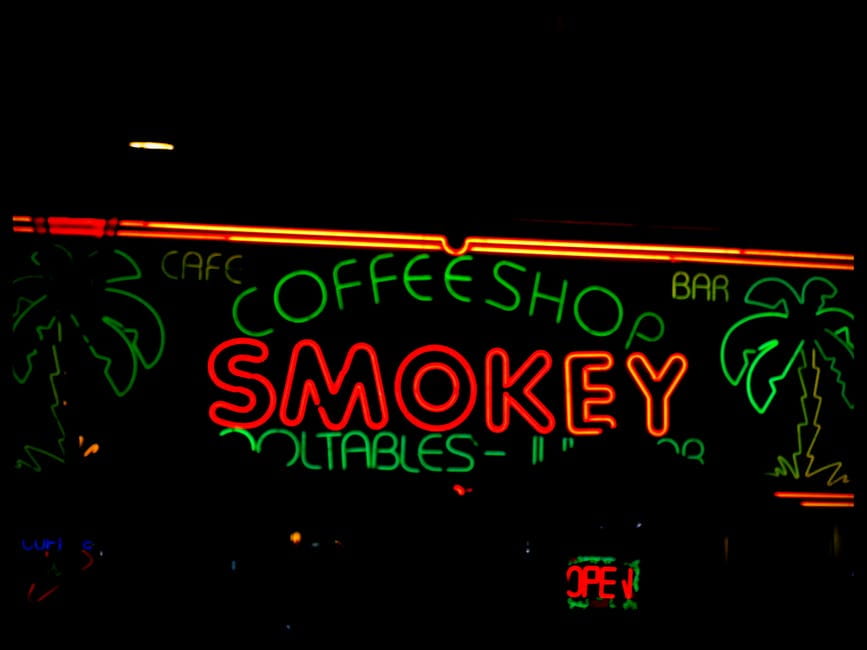Purchasing cannabis from licensed ‘coffeeshops’ and possessing small amounts of cannabis is tolerated in the Netherlands due to steps taken in the 1970s where a formal written policy of non‐enforcement for violations involving possession or sale of a limited amount of cannabis was adopted.[1] Cannabis production and wholesale distribution remain illegal but simple possession has been formally depenalised from a crime to a low-priority minor offence. The sale of cannabis inside licensed premises (coffeeshops) is de facto decriminalised and tolerated, with a well-defined set of national criteria to permit coffeeshops that includes no advertising, minimum purchase age 18, limit to five grams per person per day (reduced from 30 grams), and sale limited to residents (though this is largely ignored in Amsterdam).
Over time, the enforcement of the regulations has changed and some of the details have become more restrictive. For example, it took until 1997 for officials to begin to close coffeeshops for non-compliance. In 2008, tobacco smoking in coffeeshops was banned and shops located near schools began to be closed. In 2010, a town was able to ban foreigners from buying cannabis there.[2]
Since decriminalisation came into effect, the rates of cannabis use have not dramatically differed for people in the Netherlands compared to their European neighbours where cannabis is illegal.[3] In contrast, arrests and convictions for possession for personal use are very low and arrests and criminal records for use or minor possession are extremely rare. The numbers of people who use cannabis, have ever used cannabis, or have used it recently are on par with the European average and the Netherlands has the lowest level of problem drug use in the EU.[4] Arrests and convictions for use of illegal substances and possession for personal use are very low and arrests and criminal records for use or minor possession are extremely rare.[5] First-time cannabis admissions to specialised drug treatments increased and decreased in association with variations in potency (THC level).[6] Evidence suggests that the depenalisation steps did not lead to increasing rates of cannabis use, but that the commercialisation steps that came later may have led to increases in use, including among young people.[7]
Despite better public health and social outcomes, the country still faces issues with this regulatory system. A burgeoning local black market of cannabis production has drawn more heavy law enforcement in recent years. A pilot of a fully regulated recreational cannabis market is underway to guide possible policy changes in the near future. Six to ten municipalities are participating in a trial in which coffeeshops will be supplied with cannabis under strict conditions within a regulated, closed circuit. The aim is to provide an evidence base by 2025 that will allow the government to decide upon future steps in Dutch cannabis policy.[8]
References
[1] Quintas et al., Decriminalization: Different Models in Portugal and Spain (Cham: Springer International Publishing, 2017)
[2] MacCoun, “What Can We Learn from the Dutch Cannabis Coffeeshop System?,” Addiction 106, no. 11 (2011)
[3] MacCoun, “What Can We Learn from the Dutch Cannabis Coffeeshop System?,” Addiction 106, no. 11 (2011)
[4] Grund et al., “Drug Policy in the Netherlands,” European drug policies: The ways of reform (2017)
[5] Grund et al., “Drug Policy in the Netherlands,” European drug policies: The ways of reform (2017)
[6] Freeman et al., “Changes in Cannabis Potency and First-Time Admissions to Drug Treatment: A 16-Year Study in the Netherlands,” Psychological Medicine 48, no. 14 (2018)
[7] MacCoun et al., “Interpreting Dutch Cannabis Policy: Reasoning by Analogy in the Legalization Debate,” Science 278, no. 5335 (1997)
[8] Korf, “Cannabis Regulation in Europe: Country Report Netherlands”, 2019

